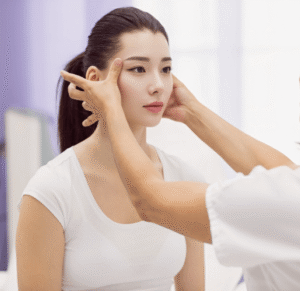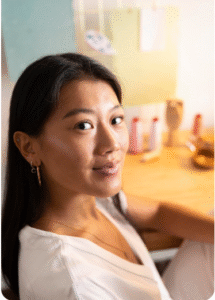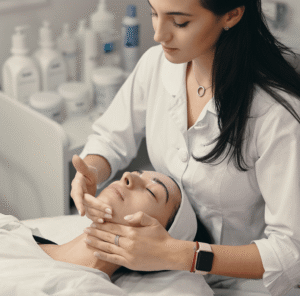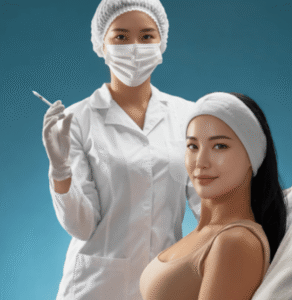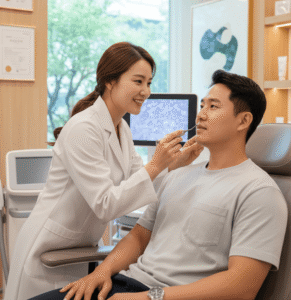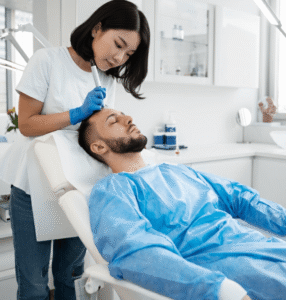What it is
Breast self-examination (BSE) is a method of checking your own breasts or chest for any unusual changes, lumps, or signs that may indicate conditions such as breast cancer, cysts, or infections. Regular self-checks can help with early detection and improve the effectiveness of treatment if abnormalities are found.
Key points:
- Non-invasive, simple, and can be performed at home.
- Recommended for all individuals with breast tissue, including women, men, and those undergoing hormone therapy.
- Complements clinical examinations and mammography, but does not replace professional screening.
- Helps individuals be familiar with their normal breast texture to detect subtle changes.
Why it’s done
Breast self-examination is performed for several reasons:
- Early detection of abnormalities: Increases the chance of identifying lumps, thickening, or other changes early.
- Awareness of normal breast patterns: Knowing the usual shape, texture, and size helps notice unusual changes.
- Preventive health measure: Encourages proactive health monitoring and timely medical consultation.
- Support clinical screening: Provides additional information for healthcare providers.
Note: While BSE is important, it is not a substitute for mammograms, ultrasounds, or clinical breast exams, especially for individuals at higher risk of breast cancer.
Alternatives
Other methods for checking breast health include:
- Clinical breast examination (CBE): Performed by a healthcare professional during routine check-ups.
- Mammography: X-ray imaging recommended for women aged 40 and above or at high risk.
- Breast ultrasound: Often used for younger individuals or dense breast tissue.
- MRI scans: For high-risk patients or complex cases.
- Genetic testing: For individuals with a family history of breast or ovarian cancer.
Important: Combining self-examination with professional screenings enhances early detection and safety.
Preparation
Before performing a self-check, proper preparation ensures accuracy and comfort:
- Choose the right time: Perform BSE 3–5 days after your period ends when breasts are less swollen or tender. For postmenopausal individuals, select a consistent day each month.
- Gather tools: Use a mirror, clean hands, and adequate lighting.
- Know your normal pattern: Be familiar with size, shape, and texture of your breasts and chest.
- Optional aids: Some use lotion or oil for smoother palpation.
Patient instructions:
- Wear comfortable clothing that can be easily removed.
- Ensure a private, relaxed environment to focus on examination.
- Keep a journal or notes to track any findings over time.
How it’s done
Breast self-examination involves visual inspection and palpation:
1. Visual Inspection:
- Stand in front of a mirror with arms at your sides, then raised overhead, and finally hands pressed on hips.
- Look for:
- Changes in size, shape, or symmetry.
- Dimpling, puckering, or bulging of skin.
- Nipple changes: Inversion, discharge, or redness.
- Any visible swelling or redness.
2. Manual Palpation (lying down and standing):
- Lying down: Place a pillow under your shoulder, and use three middle fingers to feel the entire breast in small circular motions.
- Cover from collarbone to top of abdomen, and armpit to cleavage line.
- Apply different pressure levels: light (surface), medium (middle tissue), and firm (deep tissue).
- Standing or shower: Use similar circular motions while skin is wet or soapy to detect any subtle lumps.
3. Nipple Examination:
- Gently squeeze each nipple to check for discharge, bleeding, or unusual secretions.
Frequency:
- Most guidelines recommend monthly self-exams, preferably at the same point in your menstrual cycle.
Recovery and Benefits
Although BSE is not a treatment, the benefits include:
- Early awareness: Increased familiarity with your breast tissue helps detect abnormal changes sooner.
- Empowerment: Encourages proactive health monitoring and responsibility.
- Peace of mind: Regular checks reassure you when no changes are present.
- Support for clinical care: Findings can guide doctors during professional evaluations.
Tip: Any unusual findings should prompt timely consultation with a healthcare provider.
Complications
Breast self-examination is safe, but some considerations include:
- False reassurance: Normal BSE does not guarantee absence of cancer.
- Anxiety or stress: Finding a lump may cause worry; professional evaluation is important.
- Improper technique: May miss small or deep lumps if not performed correctly.
Prevention:
- Learn proper technique from a qualified healthcare provider or educational resources.
- Combine BSE with regular clinical exams and imaging.
- Report any new or persistent changes immediately.
Treatment Options in Korea
In Korea, breast health monitoring is well-supported by public and private healthcare:
Key features:
- Clinical breast exams are available at general hospitals and women’s health clinics.
- Mammography and breast ultrasound widely accessible for early screening.
- Breast cancer awareness programs provide education on self-examination and risk factors.
- Home self-examination is encouraged as a complementary measure alongside routine screenings.
- Korean hospitals follow international guidelines for early detection and patient education.
Summary: Learning how to check your breasts or chest empowers individuals to detect changes early, supports preventive care, and complements professional screening. Proper technique, monthly monitoring, and timely consultation with healthcare providers ensure optimal breast health and early intervention if abnormalities arise.


